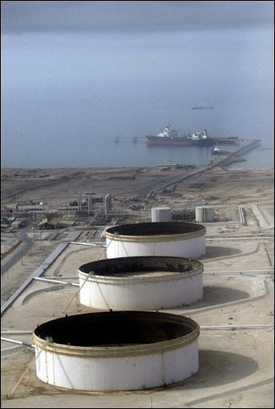
China’s biggest refiner, Sinopec, and Iran have signed a $2 billion agreement on developing the Yadavaran oil field, on Tuesday, firming Beijing’s business links with Tehran despite global sanctions over Iran’s peaceful nuclear program.
The long-awaited agreement signed in Tehran completes a 2004 memorandum of understanding for state-owned Sinopec Group to help develop the huge oilfield. Iran’s oil minister, Gholam Hossein Nozari, praised the deal as a vindication of his country’s efforts to counter pressures to isolate the country over its nuclear program.
“Various companies are continuing to invest in Iran and that we are witnessing the full presence of foreign investments in the country,” the Iranian radio network Voice of the Islamic Republic of Iran, quoted Nozari as saying. “The other message this contract has is that if other countries intend to invest in our major oil and gas fields, they should not waste time, otherwise they will surely lose investment opportunities in Iran,” he said. Nozari estimated the cost of the project at $2 billion, the official Xinhua news agency reported.
Zhou Baixiu, head of Sinopec’s International Exploration and Production Unit, and Hossein Noqreka-Shirazi, head of international affairs for the Iranian Petroleum Ministry, signed the agreement, the reports said. Sinopec’s publicly traded unit, China Petroleum and Chemical Co., has shares traded in New York, London, Hong Kong and Shanghai.
The Chinese company appeared to be seeking to keep the agreement low key. It did not make any official announcement of the deal. China has been snapping up energy resources across the globe as it seeks to ensure supplies of oil and gas to fuel its booming economy.
Beijing has steadfastly balked at U.S. demands for new United Nations sanctions against Iran over its nuclear program, arguing for diplomatic solutions to the standoff over whether it is developing atomic weapons. Iranian news reports said the lengthy delay in an agreement on developing Yadavaran was due to commercial issues, not the nuclear controversy. The Yadavaran deal calls for the Chinese company to invest in developing the oilfield in two phases, with the first phase to produce 85,000 barrels per day to be carried out in four years.
The second phase, to produce an additional 100,000 barrels per day, is to be completed in another three years, Xinhua said, citing Nozari. Earlier reports had said the two sides were divided over Sinopec’s request for a 15 percent return from the project and over the planned capacity for the project.
China had argued for a target of 180,000 barrels a day to avoid excess production, according to Chinese state media reports. The Yadavaran field is expected to have a potential output of 300,000 barrels per day of crude oil. It has 3.2 billion barrels of recoverable reserves, with recoverable gas reserves estimated at 2.7 trillion cubic feet or 80 billion cubic meters.










